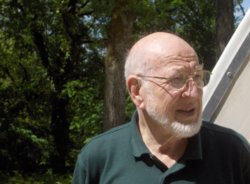How many countries will get the bomb?
23 Mar, 2009 09:07 pm
Most, if not all, of the world?s political leaders pay lip service to the need to prevent the further spread of nuclear weapons to countries that do now have them. Whether or not nuclear-weapon proliferation can be stopped will almost certainly depend on the outcome of next year?s Conference to Review the operation of the 1970 Nuclear Non-Proliferation Treaty (NPT). The NPT is unlikely to survive if the Conference fails to strengthen it.
 |
The concept of a FMCT dates back to the end of the Second World War in 1945. It was, for example, part of the American Baruch Plan, presented to the United Nations Atomic Energy Commission on 14 June 1946, to control nuclear energy, to ensure its use only for peaceful purposes, and to eliminate nuclear weapons under effective international safeguards (2). But the Baruch Plan came to nothing.
A FMCT was further advanced by President Dwight Eisenhower in his 'Atoms for Peace' speech at the United Nations General Assembly on 8 December, 1953 (3). And it was much discussed during the 1960s, when the negotiations for a NPT were in progress.
After 1978, resolutions calling for a ban on the production of fissile materials for nuclear weapons were regularly passed by the General Assembly but there was little hope of progress while the Cold War was on.
With the end of the Cold War and the perceived need to make progress in arms control, the concept in its own right was given a considerable impetus by President Bill Clinton. In his speech to the General Assembly in September 1993 he said: "We will pursue new steps to control the materials for nuclear weapons. Growing global stockpiles of plutonium and highly enriched uranium are raising the danger of nuclear terrorism in all nations. We will press for international agreement that would ban production of these materials for ever." (4) Such strong American support seemed to make such a ban realistic and attainable.
In 1993, General Assembly Resolution 48/75L, adopted by consensus, recommended the negotiation of a non-discriminatory, multilateral, and internationally and effectively verifiable treaty banning the production of fissile material for nuclear weapons and other nuclear explosive devices. It requested the "International Atomic Energy Agency to provide assistance for examination of verification arrangements for such a treaty" (5).
The treaty described in the Resolution would ban production but it says nothing about existing stocks of fissile materials.
As defined in the United Nations General Assembly Resolution, a treaty banning the production of fissile materials would cover the production of weapon-grade plutonium (plutonium containing more than 93 per cent of the isotope plutonium-239), weapon-grade highly-enriched uranium (uranium enriched to over 90 per cent uranium-235), and uranium-233 for nuclear weapons or other nuclear explosive devices, or outside of international safeguards.
On 25 January 1994, the members of the CD in
It was not until 23 March 1995 that Ambassador Shannon was able to report consensus on the negotiating mandate for the fissile-material ban and the establishment of an "Ad hoc Committee to negotiate a non-discriminatory, multilateral and internationally and effectively verifiable treaty banning the production of fissile material for nuclear weapons or other explosive devices." The difficulty about defining the scope of the ban was not solved but the adoption of the mandate was achieved by a compromise (some would say a fudge).
In the words of Ambassador Shannon: “During the course of my consultation, many delegations expressed concerns about a variety of issues relating to fissile material, including the appropriate scope of the convention. Some delegations expressed the view that this mandate would permit consideration in the Committee only of the future production of fissile material. Other delegations were of the view that the mandate would permit consideration not only of future but also of past production.
Still others were of the view that consideration should not only relate to production of fissile materials (past or future) but also to other issues, such as the management of such material. It has been agreed by delegations that the mandate for the establishment of the ad hoc Committee does not preclude any delegation from raising for consideration in the ad Hoc Committee any of the above noted issues” (6).
No further progress on discussions in the CD about a FMCT was made until after the 1998 Indian and Pakistani nuclear-weapon tests. Until then, a number of CD members, mainly from non-aligned countries, wanted the negotiation of a FMCT to be linked with discussions of a phased timetable of nuclear disarmament. The established nuclear-weapon powers have consistently refused to agree to such a link.
At the end of its 1998 session, the CD did establish an ad hoc committee to start negotiations of a FMCT. Canadian Ambassador Mark Moher chaired the committee. The committee lasted only three weeks before the session ended. Very little has happened since.
Major obstacles to getting the negotiation of treaty underway were conflicts over how to deal with existing military stockpiles of fissile materials and over the relation of a FMCT to nuclear disarmament, particularly to a timed programme of nuclear disarmament.
The attitudes of the
A FMCT is needed: to re-start negotiations in the CD on further nuclear arms control and disarmament measures; to control nuclear-weapon proliferation; to encourage the control of fissile materials from which nuclear weapons or nuclear explosives can be fabricated; to increase the amount of fissile materials that can be used to fabricate nuclear weapons under international safeguards; and to improve the effectiveness of nuclear export policies. Without a FMCT there is, to say the least, very unlikely to be any progress in nuclear arms control and disarmament or in the abolition of nuclear weapons.
An effective FMCT would reduce the risk that terrorists will acquire fissile materials to fabricate nuclear explosives by reducing access to fissile materials. By preventing the further production of them for use in nuclear weapons and increasing the amount of them under international safeguards a FMCT would make it more difficult to divert illegally fissile materials for the fabrication of nuclear weapons.
A number of draft texts for a potential FMCT exist.
This failure does not bode well for next year’s NPT Review Conference. If no progress can be made on a FMCT what hope is there for strengthening the NPT? The prospect we face is that the NPT will fail and that many other countries will acquire nuclear weapons, joining the nine countries that now have them. Nuclear wars will then become virtually inevitable.
References
1. For a description of a FMCT see:
www.fas.org/nuke/control/fmct/
2. Atomic Archive, The Baruch Plan,
www.atomicarchive.com/Docs/Deterrence/BaruchPlan.shtml
3. The full text of President Dwight D. Eisenhower's Atoms for Peace speech is given in:
www.americanrhetoric.com/speeches/dwightdeisenhoweratomsforpeace.html
4. Thomas L. Friedman, Clinton to outline new
5. The United Nations General Assembly Resolution 48/75L is given in:
www.fissilematerials.org/ipfm/pages_us_en/popups/popups/popups.php?popup...UNGA%20Resolution%2048%2075%20L
6. See: Documents of the Conference on Disarmament on the issue of Fissile Material at
www.mcis.soton.ac.uk/Site_Files/pdf/bb-volii-2005/sections.pdf
-
12/12/12
“Peak Oil” is Nonsense… Because There’s Enough Gas to Last 250 Years.
-
05/09/12
Threat of Population Surge to "10 Billion" Espoused in London Theatre.
-
05/09/12
Current Commentary: Energy from Nuclear Fusion – Realities, Prospects and Fantasies?
-
04/05/12
The Oil Industry's Deceitful Promise of American Energy Independence
-
10:00
Shaky Foundations for Offshore Wind Farms
2 comment(s)
[1]
Comment by Dave P
25 Mar, 2009 04:14 pm
Too many will get there, unfortunately there is nothing we can do to stop them, neither do we have the right = unfortunate
 Alert Moderator
Alert Moderator
[2]
Comment by Global Changes
6 Apr, 2009 01:43 pm
I think Obama has made it clear that he supports Nuclear Disarmament and his talks with Russia seem t back that up
 Alert Moderator
Alert Moderator







 Read more
Read more